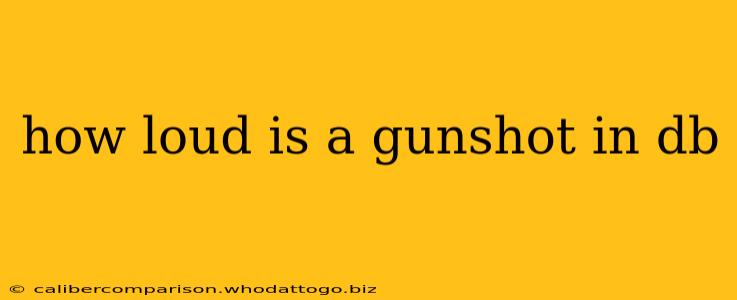How Loud is a Gunshot in dB? The Decibel Decoded
The question "How loud is a gunshot in dB?" doesn't have a single, simple answer. The decibel (dB) level of a gunshot varies dramatically depending on several factors. Understanding these factors is crucial to grasping the true impact of firearm noise.
Factors Affecting Gunshot Loudness
Several key variables significantly influence the sound intensity of a gunshot, impacting the final dB reading:
-
Type of Firearm: A small caliber pistol will produce a considerably lower dB level than a high-powered rifle. The size of the cartridge, the type of ammunition, and the firearm's design all play roles. A .22 pistol will be much quieter than a .30-06 hunting rifle.
-
Ammunition Type: Even with the same firearm, different ammunition types (e.g., subsonic vs. supersonic) will generate varying dB levels. Supersonic ammunition, exceeding the speed of sound, creates a sonic boom, adding significantly to the overall loudness.
-
Distance from the Muzzle: The closer you are to the firearm when it is discharged, the louder the sound will be. The sound intensity diminishes with distance, following an inverse square law. A gunshot measured at 1 meter will be significantly louder than one measured at 10 meters.
-
Environment: The environment plays a substantial role in how sound propagates. An open field will allow sound waves to travel unimpeded, while a confined space like an indoor shooting range will increase the perceived loudness due to reflections and reverberations.
Typical dB Levels (Approximate)
While providing exact dB levels is impossible without specific details, we can offer a general range:
- Handguns (small caliber): 140-150 dB
- Handguns (large caliber): 150-160 dB
- Rifles (small caliber): 150-160 dB
- Rifles (large caliber): 160-170 dB
Important Note: These are approximate values. The actual dB level can be higher or lower based on the factors mentioned earlier. Furthermore, these levels are often measured at a close distance to the firearm.
The Dangers of Gunshot Noise
The high dB levels associated with gunshots pose significant risks to hearing health. Exposure to such intense sounds can cause immediate and long-term hearing damage, including:
- Temporary Threshold Shift (TTS): Temporary hearing loss that resolves itself after a period of time.
- Permanent Threshold Shift (PTS): Permanent hearing loss that does not recover. This can lead to tinnitus (ringing in the ears) and hyperacusis (increased sensitivity to sound).
Hearing Protection is Crucial
Given the potential for serious hearing damage, wearing appropriate hearing protection is paramount when handling firearms. This includes earmuffs and earplugs, used together for maximum protection. Never underestimate the damaging potential of even a single, seemingly quiet gunshot. Always prioritize safety.
Conclusion
The loudness of a gunshot in dB is not a fixed number. It's a complex calculation influenced by several factors. Understanding these factors highlights the importance of proper hearing protection when using firearms. The risk of significant and potentially irreversible hearing damage is substantial, underscoring the need for responsible gun handling practices and the consistent use of hearing protection.

